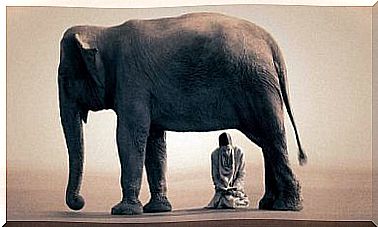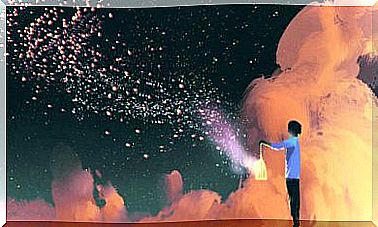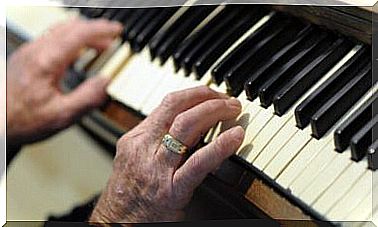Seeking Pleasure Makes Us Addicted To Suffering

Seeking pleasure makes us addicted to suffering. Almost without knowing it, we have become captives of the ephemeral enjoyment, of the attachment with an expiration date, that which prompts us to desperately search for new stimuli, new ways to feed the ego, the need and even the emptiness. Much of society slips into the confusion of pleasure with happiness.
There is a book that serves as a perfect metaphor for this, it is titled: All the pain that money allowed me to buy. In its pages we discover the life of Christina Onassis, the daughter of the famous tycoon Aristotle Onassis. When the latter died, his young daughter inherited an immense fortune that she spent exclusively on alleviating her unhappiness.
He spent large amounts of money on the most extravagant pleasures, but none of those things healed the wound of loneliness and despondency. He died at the age of 37 after an overdose of sleeping pills. His case is one more example of how, sometimes, the human being clings to the need for constant delight as an escape mechanism and also as a patch for emotions that exceed his management capacity.

Seeking pleasure makes us addicted to suffering
Buddha said in the Four Noble Truths that one of the reasons for human suffering is his constant need to cling to pleasure. Thus, one way to free ourselves from that cycle of discomfort was, according to him, to “purge” ourselves of our need for attachment to that vast universe of fleeting joys, of meaningless delights. This idea is little more than a fulfilled prophecy of what we experience today.
Aldous Huxley also anticipated it with his particular classic, Brave New World , written in 1932. In it, he presented us with a dystopian society oriented only to the pursuit of endless pleasure. Something that might seem idyllic to us, contains the reality of a scenario very close to the current one, one in which unhappiness has become chronic and we try to alleviate it with the most varied psychoactive drugs.
When pleasure dopamine inhibits wellness serotonin
Robert Lustig is a neuroendocrinologist and professor at the University of California, San Francisco. To this day, he is considered one of the foremost experts in understanding the dopamine and serotonin circuits. Well, we know that soon he will publish a work entitled Metabolical that may change many of the current ideas we have about neurotransmitters.
Something that Dr. Lustig points out to us is that seeking pleasure makes us addicted to suffering. We analyze it below:
- Orienting behavior to momentary pleasure makes us addicted. The person who, for example, bases his day to day on obtaining that like on social networks, on obtaining a match in that application and having a relationship for one night or a few days shows very specific neurochemical processes.
- Their search for rewards (positive reinforcements) activates the mechanism of dopamine, that exciting molecule, also related to addictive behaviors.
- A brain that bases its existence on achieving that daily dose of dopamine (such as that from junk food) ends up suffering a decrease in serotonin.
- This last neurotransmitter (relaxing and more durable) is the one that provides us with real well-being.
In essence, nothing reverses human suffering as much as the pursuit of pleasure, because with that behavior we actually inhibit the production of the molecule of happiness: serotonin.
Pleasure and pain share the same pathways in the brain
We like to feel, but we are obsessed with sensory feasts, those in which we devour life in bites, even if we end up intoxicated. We want it all and we want it now, we are impatient creatures capable of standing in long queues just to get the latest mobile phone.
We are also those people intolerant of frustration and negative emotions because what we do, on average, is hedonism, being well without looking at whom. Where does this lead us? To the abyss of useless suffering. Because life is not easy, we are often disappointed, frustrated and even angry.
Before this we run away, we look for the pleasure of that pizza and those french fries. Of the likes in that selfie that we just uploaded. In those compulsive purchases with which to acquire things that, in reality, we discover later that we do not need. We do it without knowing that pleasure and pain share the same neuronal substrates.
In a study carried out at the University of Oslo, they show us that the anatomical pathways of pleasure and pain are the same. The brain modulates them depending on each situation. This explains that closeness between one sphere and another.

Invest in well-being, not so much in pleasure
Excess dopamine, orchestrated by the obsessive search for positive reinforcement and pleasure, shuts down serotonin receptors. We must become aware that a change is necessary. Obviously, as human beings we cannot give up enjoyment, to seek that pleasure that from time to time pleases and feels good.
However, those experiences add up when they are not a constant. Orienting existence to empty and ephemeral enjoyment makes us addicted, as is someone who cannot stop resorting to junk food, video games or online pornography. You need to change your focus and invest in wellness.
In this sense, we win when we perform behaviors that release more serotonin than dopamine. This requires more thoughtful attitudes, more skillful behaviors with which to invest in good emotional management, learn to tolerate stress and impulses.









